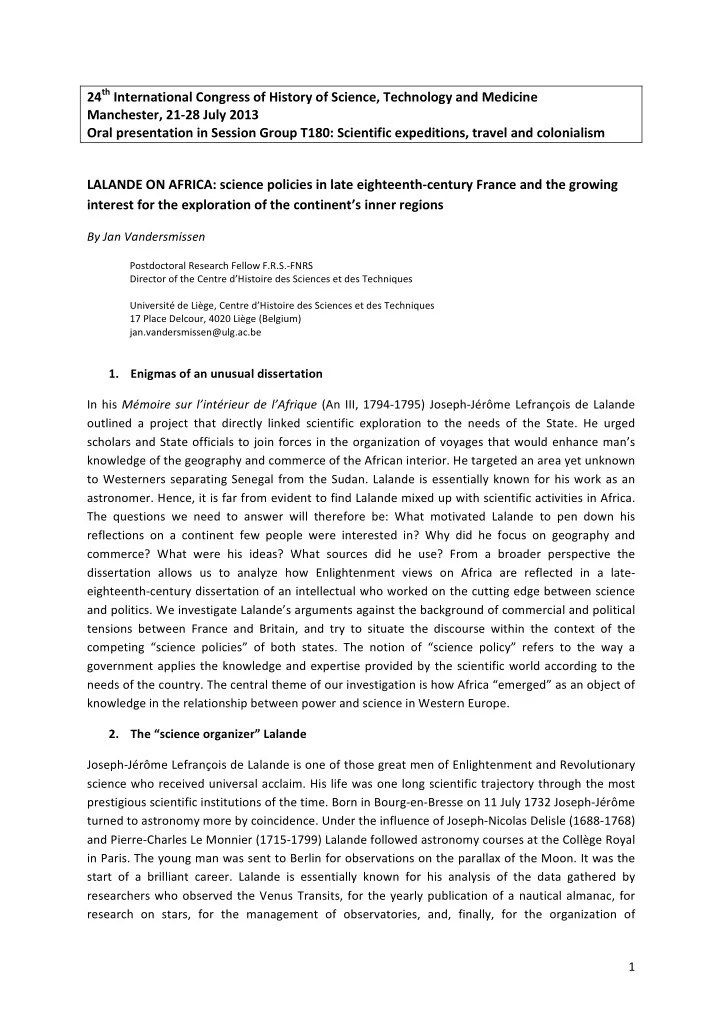

24 th ¡International ¡Congress ¡of ¡History ¡of ¡Science, ¡Technology ¡and ¡Medicine ¡ Manchester, ¡21-‑28 ¡July ¡2013 ¡ Oral ¡presentation ¡in ¡Session ¡Group ¡T180: ¡Scientific ¡expeditions, ¡travel ¡and ¡colonialism ¡ ¡ LALANDE ¡ON ¡AFRICA: ¡science ¡policies ¡in ¡late ¡eighteenth-‑century ¡France ¡and ¡the ¡growing ¡ interest ¡for ¡the ¡exploration ¡of ¡the ¡continent’s ¡inner ¡regions ¡ By ¡Jan ¡Vandersmissen ¡ Postdoctoral ¡Research ¡Fellow ¡F.R.S.-‑FNRS ¡ Director ¡of ¡the ¡Centre ¡d’Histoire ¡des ¡Sciences ¡et ¡des ¡Techniques ¡ ¡ Université ¡de ¡Liège, ¡Centre ¡d’Histoire ¡des ¡Sciences ¡et ¡des ¡Techniques ¡ 17 ¡Place ¡Delcour, ¡4020 ¡Liège ¡(Belgium) ¡ jan.vandersmissen@ulg.ac.be ¡ ¡ ¡ 1. Enigmas ¡of ¡an ¡unusual ¡dissertation ¡ In ¡his ¡Mémoire ¡sur ¡l’intérieur ¡de ¡l’Afrique ¡(An ¡III, ¡1794-‑1795) ¡Joseph-‑Jérôme ¡Lefrançois ¡de ¡Lalande ¡ outlined ¡ a ¡ project ¡ that ¡ directly ¡ linked ¡ scientific ¡ exploration ¡ to ¡ the ¡ needs ¡ of ¡ the ¡ State. ¡ He ¡ urged ¡ scholars ¡and ¡State ¡officials ¡to ¡join ¡forces ¡in ¡the ¡organization ¡of ¡voyages ¡that ¡would ¡enhance ¡man’s ¡ knowledge ¡of ¡the ¡geography ¡and ¡commerce ¡of ¡the ¡African ¡interior. ¡He ¡targeted ¡an ¡area ¡yet ¡unknown ¡ to ¡Westerners ¡separating ¡Senegal ¡from ¡the ¡Sudan. ¡Lalande ¡is ¡essentially ¡known ¡for ¡his ¡work ¡as ¡an ¡ astronomer. ¡Hence, ¡it ¡is ¡far ¡from ¡evident ¡to ¡find ¡Lalande ¡mixed ¡up ¡with ¡scientific ¡activities ¡in ¡Africa. ¡ The ¡ questions ¡ we ¡ need ¡ to ¡ answer ¡ will ¡ therefore ¡ be: ¡ What ¡ motivated ¡ Lalande ¡ to ¡ pen ¡ down ¡ his ¡ reflections ¡ on ¡ a ¡ continent ¡ few ¡ people ¡ were ¡ interested ¡ in? ¡ Why ¡ did ¡ he ¡ focus ¡ on ¡ geography ¡ and ¡ commerce? ¡ What ¡ were ¡ his ¡ ideas? ¡ What ¡ sources ¡ did ¡ he ¡ use? ¡ From ¡ a ¡ broader ¡ perspective ¡ the ¡ dissertation ¡ allows ¡ us ¡ to ¡ analyze ¡ how ¡ Enlightenment ¡ views ¡ on ¡ Africa ¡ are ¡ reflected ¡ in ¡ a ¡ late-‑ eighteenth-‑century ¡dissertation ¡of ¡an ¡intellectual ¡who ¡worked ¡on ¡the ¡cutting ¡edge ¡between ¡science ¡ and ¡politics. ¡We ¡investigate ¡Lalande’s ¡arguments ¡against ¡the ¡background ¡of ¡commercial ¡and ¡political ¡ tensions ¡ between ¡ France ¡ and ¡ Britain, ¡ and ¡ try ¡ to ¡ situate ¡ the ¡ discourse ¡ within ¡ the ¡ context ¡ of ¡ the ¡ competing ¡ “science ¡ policies” ¡ of ¡ both ¡ states. ¡ The ¡ notion ¡ of ¡ “science ¡ policy” ¡ refers ¡ to ¡ the ¡ way ¡ a ¡ government ¡applies ¡the ¡knowledge ¡and ¡expertise ¡provided ¡by ¡the ¡scientific ¡world ¡according ¡to ¡the ¡ needs ¡of ¡the ¡country. ¡The ¡central ¡theme ¡of ¡our ¡investigation ¡is ¡how ¡Africa ¡“emerged” ¡as ¡an ¡object ¡of ¡ knowledge ¡in ¡the ¡relationship ¡between ¡power ¡and ¡science ¡in ¡Western ¡Europe. ¡ 2. The ¡“science ¡organizer” ¡Lalande ¡ Joseph-‑Jérôme ¡Lefrançois ¡de ¡Lalande ¡is ¡one ¡of ¡those ¡great ¡men ¡of ¡Enlightenment ¡and ¡Revolutionary ¡ science ¡who ¡received ¡universal ¡acclaim. ¡His ¡life ¡was ¡one ¡long ¡scientific ¡trajectory ¡through ¡the ¡most ¡ prestigious ¡scientific ¡institutions ¡of ¡the ¡time. ¡Born ¡in ¡Bourg-‑en-‑Bresse ¡on ¡11 ¡July ¡1732 ¡Joseph-‑Jérôme ¡ turned ¡to ¡astronomy ¡more ¡by ¡coincidence. ¡Under ¡the ¡influence ¡of ¡Joseph-‑Nicolas ¡Delisle ¡(1688-‑1768) ¡ and ¡Pierre-‑Charles ¡Le ¡Monnier ¡(1715-‑1799) ¡Lalande ¡followed ¡astronomy ¡courses ¡at ¡the ¡Collège ¡Royal ¡ in ¡Paris. ¡The ¡young ¡man ¡was ¡sent ¡to ¡Berlin ¡for ¡observations ¡on ¡the ¡parallax ¡of ¡the ¡Moon. ¡It ¡was ¡the ¡ start ¡ of ¡ a ¡ brilliant ¡ career. ¡ Lalande ¡ is ¡ essentially ¡ known ¡ for ¡ his ¡ analysis ¡ of ¡ the ¡ data ¡ gathered ¡ by ¡ researchers ¡who ¡observed ¡the ¡Venus ¡Transits, ¡for ¡the ¡yearly ¡publication ¡of ¡a ¡nautical ¡almanac, ¡for ¡ research ¡ on ¡ stars, ¡ for ¡ the ¡ management ¡ of ¡ observatories, ¡ and, ¡ finally, ¡ for ¡ the ¡ organization ¡ of ¡ ¡ 1 ¡
Recommend
More recommend